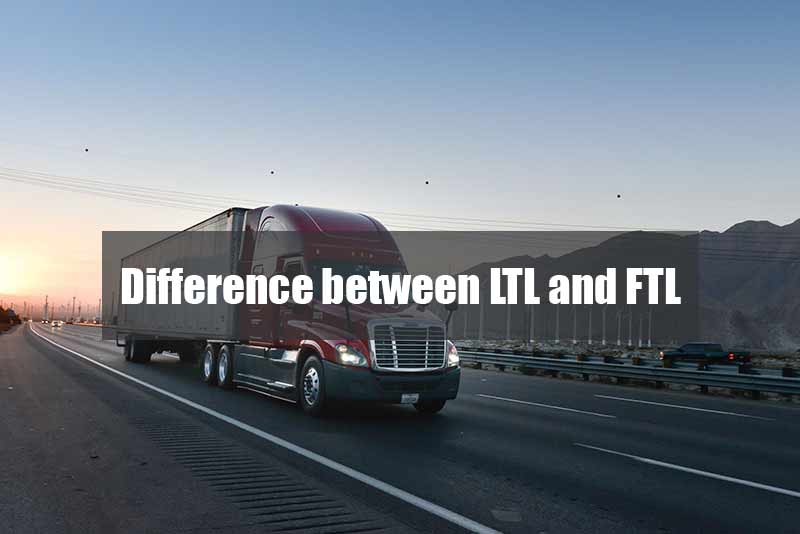
In the shipping and trucking industry, you might have heard these two common terms: LTL Trucking and FTL freight shipping. But do you really know the difference between the two and when these two trucking modes are used? Shipping companies, trucking companies and freight brokers provide freight quote by identifying whether its Truckload or LTL. In this post you will find the most common differences between LTL trucking and FTL trucking.
What is LTL freight?
Less than truckload (LTL) is a shipping method for goods and items that don’t require the whole space of a truck. LTL shipments typically weigh between 100 and 10,000 pounds. LTL carriers only carry weight upto 10,000 pounds which is a permitted limit.
In LTL trucking, you are only charged for the space that your freight occupies in a truck and not for a full truck. If your shipment only takes up a small space on the truck, you only pay for that much space. The rest of the truck will then be filled with other small shipments from other companies, making LTL freight a perfect fit for small businesses shipping that don’t ship in large quantities and are looking for something that is budget friendly.
However, one must keep in mind that LTL freight shipments often take a bit longer to reach their destinations, due to the multiple shipments on board from various other companies and businesses, creating frequent stops whih increases the transit time. If time is of the essence, you may want to consider FTL shipping. Freight rate or shipping quote are provided by the LTL carriers based on the class to which a freight belongs to, distance and the space it occupies in the truck. Typically LTL freight are palletized.
What is FTL Freight?
Full truckload (FTL) is used for freight shipments that take up an entire truck’s weight or space capacity. Transportation services provided by trucking companies such as FTL shipments are typically used when there are multiple palettes that need to ship or in case a single freight takes the entire space in a truck.
Here’s a complete guide to Federal Regulations about Freight Management and Operations.
If you have a high-risk freight then FTL is the most suitable shipping mode. Items that are highly fragile in nature can be shipped through FTL mode.
FTL shipments stay on the same truck the entire time and aren’t transferred during transport, so there is significantly less risk of damage. This method of transportation is also much quicker than LTL, since only one shipment is on board and there won’t be multiple stops along the way.
You can also visit the US Department of Transportation Website for complete information on regulations relating to the transportation and shipping.
Here are the most common differences between LTL freight and Full Truckload (FTL)
LTL vs FTL and which one is more affordable mode of shipping?
Cost of Shipping in LTL vs FTL shipments
LTL trucking combines the freight of multiple companies and businesses. You are not only splitting the space but also the costs with other shippers. This can be the more efficient option when you don’t have enough freight to fill a whole truck. There maybe some fuel surcharge on your shipments that you have to confirm with the Freight transportation company.
Freight Weight
LTL is the most suitable shipping mode when your freight shipments are less than 15,000 pounds, while you’d be more likely to consider FTL for shipments more than 15,000 pounds.
Urgency of Shipment
If your shipment is time-sensitive, you should prefer FTL shipping. Since FTL shipments usually pick up and deliver on the same truck, the delivery can be faster than LTL, which typically requires several stops at carrier terminals. For long haul shipments that need urgent delivery, FTL is preferable.
Handling of goods in LTL vs FTL shipments
When you are shipping highly fragile items, FTL is the most suitable options as the likelihood of damage to goods during transit and loading, unloading is must less.
These are the most common things that you must keep in mind when it comes to choosing the right freight shipping method.
We hope the above points will definitely help you decide which option best suits your freight shipping needs.
For any type of Trucking need across USA such as Furniture shipping, Heavy Equipment transportation, Restaurant equipment, Air Freight, LTL Freight, FTL or Dry van, Hazmat, Refrigerated Trucks, Flatbed and Large Trailers, Complete Transportation management, Logistics services, Third-party logistics and Freight Brokerage under one roof, Call: 201-463-6520 or fill out the form on the right to get a free quote.
